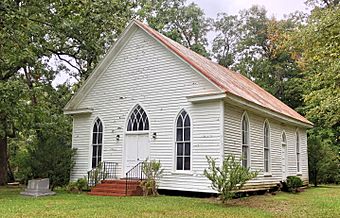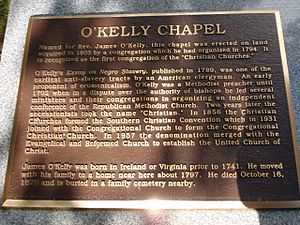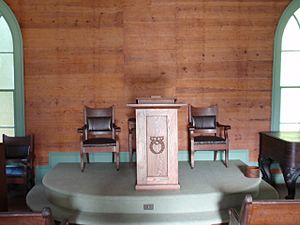O'Kelly's Chapel facts for kids
Quick facts for kids |
|
|
O'Kelly's Chapel
|
|
 |
|
| Location | NC 751, near Farrington, North Carolina |
|---|---|
| Area | 2 acres (0.81 ha) |
| Built | c. 1900 |
| Architectural style | Gothic Revival |
| MPS | Chatham County MRA |
| NRHP reference No. | 85001457 |
| Added to NRHP | July 5, 1985 |
O'Kelly's Chapel is an old church building located near Farrington, North Carolina. It is in Chatham County, North Carolina. The chapel is named after Reverend James O'Kelly. It was built around 1900. This small, one-room church has a special style called Gothic Revival. You can see this in its steep roof and tall, narrow windows.
The chapel was added to the National Register of Historic Places in 1985. This means it is an important historical site.
Contents
The Story of O'Kelly's Chapel
O'Kelly's Chapel was the main church for James O'Kelly. He was the person who started the Christian Church. O'Kelly began his work as a traveling Methodist preacher in the 1780s. At that time, the Methodist Church was not a separate group. It was part of the Church of England.
How the Christian Church Began
After the American Revolution, Methodists in America wanted to form their own church. They wanted it to be like the Church of England, with leaders having a lot of power. James O'Kelly and others disagreed. They believed the church should be more democratic. This meant ministers and churches should have more say.
O'Kelly wanted a "free" church where people had a voice. He also believed that Methodist ministers should free any enslaved people they had. He imagined a church that was like the new United States. It would be organized into groups called conferences. All pastors would have equal power, and regular church members would also have a say.
Because of their strong beliefs, O'Kelly and many others left the Methodist church. About 36 other ministers and 10,000 church members joined him. They formed a new group called "Republican Methodists."
In 1794, these people officially chose the name "Christian." They agreed to follow five main ideas:
- Jesus Christ is the only leader of the Church.
- "Christian" is a good enough name for the Church.
- The Bible is all they need to guide their faith and actions.
- Being a good Christian is enough to be a member.
- Everyone has the right to think for themselves about their faith.
James O'Kelly's Work in North Carolina
O'Kelly, as the leader, moved to Chatham County, North Carolina, in 1794. There, he started a church group that became O'Kelly Chapel. In 1797, he began another church in Orange County called Damascus Christian Church. He also started Martha's Chapel in Apex in 1803. O'Kelly traveled between these three churches as a preacher for many years.
The Christian Church that O'Kelly started was mostly active in Virginia and North Carolina. Over time, more churches were built. This group also joined with other church groups, like some Baptist churches in Vermont. Even though it was never a very large church movement, it was connected across the country.
The Chapel Building
The first members of O'Kelly's Chapel met in 1794. They probably met in O'Kelly's home. In 1803, about two acres of land were given to the Christian Church. This land was for building a church. Over the years, several different buildings were put up on the site. The current church building, which you can see today, was built in 1910. It is the fourth church structure on this spot.
There is also a cemetery on the property with about 100 graves. In 1968, a historical marker was placed at the site. In 1985, the chapel was listed on the National Register of Historic Places.
Mergers and the United Church of Christ
The Christian Church later joined with other church groups. In 1933, it united with the Congregational Church. They formed the Congregational Christian Church. Then, in 1957, this group merged with the Evangelical and Reformed Church. Together, they created the United Church of Christ. This new church aimed to bring different Protestant groups together.
Other Churches Connected to O'Kelly
In August 1794, a meeting of Methodist ministers who had left the church took place. They met in Surry County, Virginia. At this meeting, they officially formed their new church group and called it "Christian."
Historians believe that the O'Kelly Chapel church in Chatham County was started later that same year. It is thought to be the first new church building built by this Southern Christian group. Before they built churches, these new congregations met in old Methodist buildings, homes, or public places.
James O'Kelly's Life
James O'Kelly was likely born in Virginia around 1736. He married Elizabeth Meeks in 1759. They had two sons, John and William. O'Kelly was a homeowner in Virginia in 1787. When he left the Methodist Church in the early 1790s, he was a Methodist leader in southern Virginia.
The O'Kelly family moved to Chatham County, North Carolina, between 1794 and 1807. One or both of his sons were already living in North Carolina. His younger son, William, had moved to Chatham County in the mid-1780s. The O'Kelly family bought land near O'Kelly's Chapel in 1797 and more land in 1812. James and Elizabeth O'Kelly settled on the land bought in 1797, which William was farming.
Even as he got older, O'Kelly continued to start new churches. He also visited congregations and attended church meetings. James O'Kelly passed away on October 16, 1826. He was buried in the family cemetery on the farm they had bought near O'Kelly's Chapel.
Martha's Chapel
Around 1803, O'Kelly started another church in Chatham County called Martha's Chapel. It was about five or six miles south of O'Kelly's Chapel. That same year, land was given for Martha's Chapel. The purpose was to build a meeting house for preaching. The Martha's Chapel congregation likely built their first church in 1803 or 1804.
Churches in the early 1800s were small. People could only travel so far to attend services. Martha's Chapel and O'Kelly Chapel were close enough for the aging O'Kelly to serve both. Both churches continued to be active after O'Kelly's death in 1826.
Martha's Chapel continued to report its membership numbers for many years. For example, it had 32 members in 1876 and 94 members in 1934. In its last report in 1972, Martha's Chapel had 56 members. The church stopped being part of the Southern Conference of the United Church of Christ around 1972 or 1973.
Social Justice and the Church
Sometimes, different beliefs caused disagreements within the United Church of Christ. For example, in the 1970s, the UCC played a role in civil rights protests in Wilmington, North Carolina. African-American students boycotted schools there. The integrated Congregational United Church of Christ became a meeting place for these protesters. The national UCC group for racial justice sent a staff member to help organize the students. This showed the church's support for social justice.
The Chapel's Future
O'Kelly's Chapel was first formed in 1794. The building standing there today is the fourth one on the site. The church followed the idea that each person had "liberty of conscience." This meant people could interpret the Bible in their own way, as long as it followed God's law. When the Congregational Christian Churches merged with the Evangelical and Reformed Church in 1957, the chapel became part of the Southern Conference of the United Church of Christ.
Around the early 1980s, regular church services stopped at O'Kelly's Chapel. Sometimes, weddings, classes, or holiday services were held there. But even these events became less frequent over time. The building started to fall apart. In 2013, the church leaders began to discuss what to do with the chapel. Since there was no money or interest in fixing it, they decided in 2016 to sell the property.
The chapel was sold to a local landscape and garden business. The new owners do not plan to tear down the building. They are looking for ways to involve the community with the chapel. The church leaders hope that the chapel can be saved. They want it to remain a reminder of James O'Kelly's important work.
On July 29, 2018, a special ceremony was held at the chapel. This ceremony officially changed the land and chapel for non-religious use. About a dozen UCC members attended. They discussed the chapel's history and its connection to social movements. At the end of the service, a hymn written by James O'Kelly was sung.
 | Kyle Baker |
 | Joseph Yoakum |
 | Laura Wheeler Waring |
 | Henry Ossawa Tanner |






